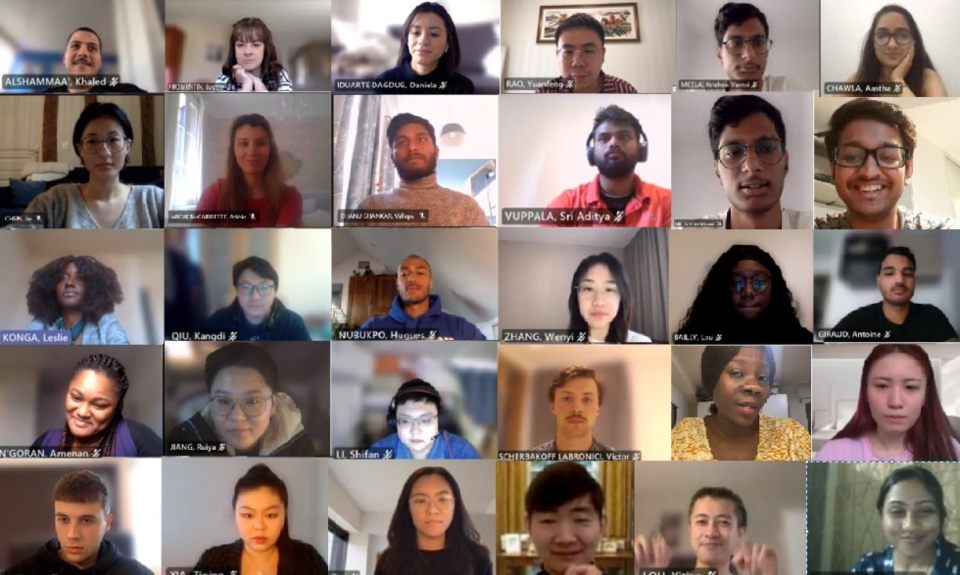Theory U: How to accompany students in the face of uncertainty?

Training future project managers requires group building and interpersonal skills more than any other course. But how can this be achieved remotely in an uncertain context? This is the challenge taken up by Desmond McGetrick, Professor of Organizational Development at SKEMA Business School, through the application of the principles of Theory U.
The evolution of COVID-related sanitary conditions these last months is a poignant reminder of the many uncertainties that students will have to face before and after graduation day. In this context, I wanted to share learnings from the experience I conducted in SKEMA Business School from 7 January-14 April 2021 with 140 students from a dozen nationalities. How to put in place a class preparing for decision-making and action in conditions of uncertainty, while the conditions of delivery of the course itself had to be adapted to sanitary conditions leading to delivery 100% online.
No need to keep the suspense alive: 52% of student responses qualified the experience as “Life Changing”, and 97% expressed the intention to put the learning into practice: hence, we have some evidence of the robust nature of the theory as it was taught.
The principles of Theory U
To act in an uncertain world, Theory U as articulated by Otto Scharmer invites a certain mindset and provides both a general framework and specific practices to build action confidence. Insofar as a key objective of the course under observation was to teach and practice Theory U, let us remind ourselves of some of its principles:
- In a context of uncertainty, the answers of tomorrow are probably not the same as the answers of yesterday
- In order to sense what would be the appropriate action, better to face the issue with an open mind, an open heart and an open will
- Deep observation precedes reflection and decision-making, while sequences of prototyping enable the integration of feedback in order to refine or adjust action in a timely manner.
Amongst the principles of Theory U, there is the implementation of mechanisms to enable the group (or more widely the system) to sense and see itself. One of the originalities of this implementation in a Higher Education context in France was the following to:
To illustrate the point, here’s the video prepared by Justine Gallet on her experience of writing a letter to her future self:
A second originality of this implementation consisted of an invitation to students to employ one of two practices from Theory U, either “stakeholder interviews” or “learning journeys”, to undertake team-based study of a theme related to the topic of the course (called “Organizational Development”), the results of which were later presented to classmates. The practice of these techniques, which emphasize respectively active listening and the observation of a system as it functions enable the students both to internalize the practices and to extend their learning of a topic area, completed by seeing what other students retained from the practice and learning from their chosen topic.
Read also: How to cultivate action confidence in an uncertain world?
A final, apparently innocent specificity manifested itself in the strong encouragement of students to join class with their cameras on, and moreover to participate with authenticity. Amongst feedback, we find this approach enable students to “see each other” despite restrictions from meeting, as illustrated with comments like the following: “It’s only in this class that we get to see each other.” Furthermore, we can state that a relationship was established, as illustrated here: “It was in this class that we met. For next semester, we have decided to share a flat together during our study abroad.”
From this experience, we can draw the following conclusions:
- Firstly, Theory U functioned well in a context of Higher Education in France and demonstrated a form of resilience in a context of uncertainty link to the evolution of sanitary conditions (COVID).
- The originalities of this implementation also functioned well, that is:
- The preparation by students of reflective videos on their experience of practices addressed in class. Semi-autonomous research by students, guided by Theory-U practices
- The fact that students agreed to turn on their cameras helped to build relationships between them, despite the cancellation of classes on site.
Given the positive feedback on the use of Theory U for a semester, it would be interesting to implement it for a complete program. By lengthening the duration, and by broaden the list of stakeholders involved, expression of change could be confirmed in acts and their impact measured.



